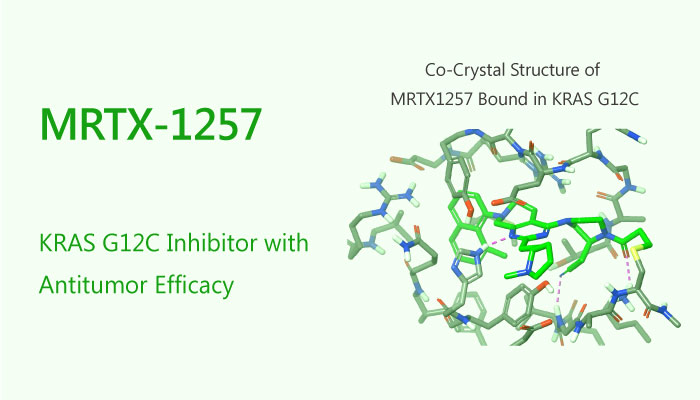
A study from Matthew A. Marx, et al found that, MRTX-1257 is a selective, covalent KRAS G12C inhibitor, with antitumor efficacy.
KRAS (K-ras or Ki-ras) is a gene that acts as an on/off switch in cell signaling. During the last several decades, the ability to target and block the function of mutated KRAS has remained elusive. Additionally, the KRAS G12C mutant is prevalent, and directly targeting this mutant with irreversible inhibitors has been demonstrated. According to the statistics, KRAS G12C mutations accounted for 14 % in NSCLC adenocarcinoma patients and 5% in colorectal patients.
In ACS meeting hold in Boston in 2018, MRTX-1257, as a novel compound has been discovered and described. In this study, the authors carried a series of experiments in vitro and in vivo to know more about the function of this compound.
Firstly, MRTX-1257 binds in the switch II pocket of KRAS G12C in the GDP bound form, showed 59% modification of KRAS G12C in the 5 min/3 µM modification assays.
In the H358 cells, the IC50 of MRTX-1257 was 0.9 nM for KRAS dependent ERK phosphorylation. Of note, it also had high hepatocyte clearance with medium permeability and efflux.
Moreover in animal models, MRTX1257 showed rapid tumor growth inhibition at all dose groups, including 1 mg/kg, 3 mg/kg, 10 mg/kg, 30 mg/kg and 100 mg/kg dose groups. And MRTX1257 showed sustained regression at 3,10, 30, and 100 mg/kg dose groups. In addition, the dose at 100 mg/kg daily leads to complete responses that are maintained >70 days after cessation of treatment.
To conclude, the clinical candidate MRTX-1257 will be discussed in more future publications.